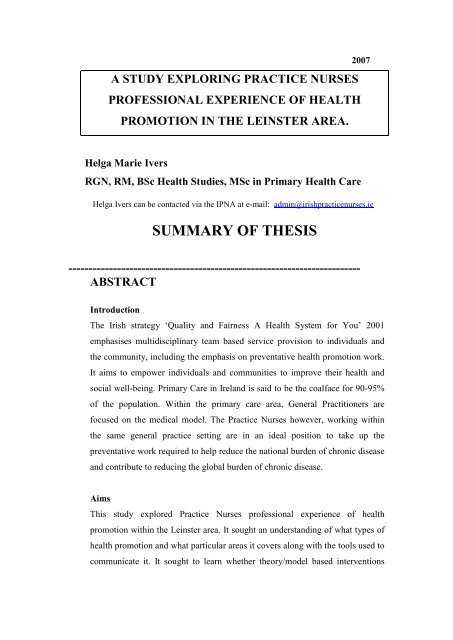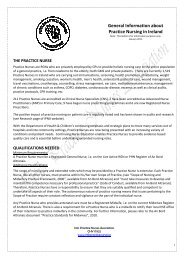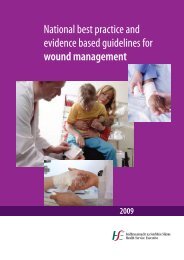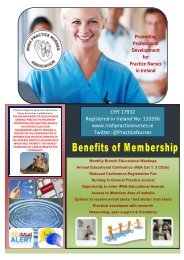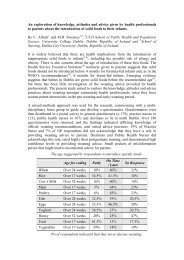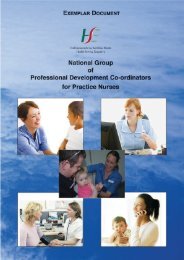SUMMARY OF THESIS - Irish Practice Nurses Association
SUMMARY OF THESIS - Irish Practice Nurses Association
SUMMARY OF THESIS - Irish Practice Nurses Association
You also want an ePaper? Increase the reach of your titles
YUMPU automatically turns print PDFs into web optimized ePapers that Google loves.
A STUDY EXPLORING PRACTICE NURSES<br />
PR<strong>OF</strong>ESSIONAL EXPERIENCE <strong>OF</strong> HEALTH<br />
PROMOTION IN THE LEINSTER AREA.<br />
2007<br />
Helga Marie Ivers<br />
RGN, RM, BSc Health Studies, MSc in Primary Health Care<br />
Helga Ivers can be contacted via the IPNA at e-mail: admin@irishpracticenurses.ie<br />
<strong>SUMMARY</strong> <strong>OF</strong> <strong>THESIS</strong><br />
------------------------------------------------------------------------<br />
ABSTRACT<br />
Introduction<br />
The <strong>Irish</strong> strategy ‘Quality and Fairness A Health System for You’ 2001<br />
emphasises multidisciplinary team based service provision to individuals and<br />
the community, including the emphasis on preventative health promotion work.<br />
It aims to empower individuals and communities to improve their health and<br />
social well-being. Primary Care in Ireland is said to be the coalface for 90-95%<br />
of the population. Within the primary care area, General Practitioners are<br />
focused on the medical model. The <strong>Practice</strong> <strong>Nurses</strong> however, working within<br />
the same general practice setting are in an ideal position to take up the<br />
preventative work required to help reduce the national burden of chronic disease<br />
and contribute to reducing the global burden of chronic disease.<br />
Aims<br />
This study explored <strong>Practice</strong> <strong>Nurses</strong> professional experience of health<br />
promotion within the Leinster area. It sought an understanding of what types of<br />
health promotion and what particular areas it covers along with the tools used to<br />
communicate it. It sought to learn whether theory/model based interventions
were utilised, and sought to learn about any barriers or challenges in<br />
implementing it.<br />
Methods<br />
Data was gathered using a qualitative research design divided into two phases. It<br />
used a self-designed questionnaire as phase one, and key informant structured<br />
interviews as phase two. The questionnaire included mixed closed and openended<br />
questions and these were then subjected to thematic content analysis. The<br />
interviews were transcribed, coded and were also subjected to thematic content<br />
analysis.<br />
Results<br />
The findings highlighted <strong>Practice</strong> <strong>Nurses</strong> huge personal commitment to<br />
practicing health promotion. It also highlighted the need for a definite role,<br />
which needs to be defined and extended. The availability of continued<br />
professional development needs to be assessed along with the requirement for a<br />
mandatory introductory course to facilitate nurses in the transition stage<br />
between secondary and primary care. The lack of the vital ingredient of “<br />
protected time” was emphasised and. a lack of appropriate courses available in<br />
some cases was also made clear. Funding issues were highlighted along with<br />
other clearly stated challenges to achieving this role of health promoter within<br />
the primary care context.<br />
Conclusions<br />
<strong>Practice</strong> <strong>Nurses</strong> have a growing role in the health promotion areas of child<br />
vaccinations, family planning, well woman/men areas, positive lifestyle<br />
management area, and increasing involvement in the management of chronic<br />
disease. <strong>Practice</strong> <strong>Nurses</strong> can make a significant contribution to the health and<br />
well being of this country with appropriate support and recognition. The support<br />
of their primary care team colleagues would also be deemed invaluable to<br />
further their commitment of care for their patients.
CHAPTER 1<br />
INTRODUCTION AND SIGNIFICANCE <strong>OF</strong> STUDY<br />
1.1 Introduction<br />
Having worked as a <strong>Practice</strong> Nurse for ten years within a primary care team, but<br />
overseas, this researcher had a keen interest in the role and practice of <strong>Practice</strong><br />
<strong>Nurses</strong> particularly in relation to health promotion. This population of <strong>Practice</strong><br />
<strong>Nurses</strong> working in the Leinster region of Ireland became the focus of this study.<br />
A 1999 i UK study found that <strong>Practice</strong> <strong>Nurses</strong> play an important role in primary<br />
care delivery, but that their precise job role was not clear. Its findings suggested<br />
that, a varied amount of decision-making was carried out, depending on the<br />
individual and their competence; their work range included an increasing<br />
amount of chronic disease management and minor illness triaging. As their<br />
work role was unclear, salary re-numeration was not appropriate for some<br />
<strong>Practice</strong> <strong>Nurses</strong>. Their role was found to be, ‘least advanced’ for mental health<br />
issues.<br />
It seems that the situation in Ireland for <strong>Practice</strong> <strong>Nurses</strong> today is somewhat<br />
similar. The <strong>Irish</strong> government have via their document ii ‘Quality and Fairness<br />
A Health System for You’2001 started to put into place many significant<br />
changes across the health service area, with a stated aim to push Primary Care<br />
and Primary Health Care to the forefront. These are seen as the first point of<br />
contact between individuals and the health and personal social services.<br />
However Maeve Wren, an <strong>Irish</strong> health services commentator, made the<br />
comment that this government would seem to have turned its back on its own<br />
strategy, iii particularly by not making appropriate funding available for the<br />
setting up of primary health care clinics. The health strategy stated that Primary<br />
Care iv :
“ Needs to become the central focus of the health system. The<br />
development of a properly integrated primary care service can lead to<br />
better outcomes, better health status and better cost-effectiveness.”<br />
<strong>Practice</strong> Nursing commenced officially in Ireland in 1989 v when the Dept of<br />
Health formally offered a subsidy to General Practitioners, towards the cost of<br />
employing a practice nurse provided that her contract had a clear job description<br />
and that a copy of it was to be held by the Dept of Health. <strong>Practice</strong> <strong>Nurses</strong> have<br />
increased the scope of their role since then. Their role in Ireland is vi seen as a<br />
generalist one practicing in many areas such as women’s health, diabetes,<br />
coronary heart disease, asthma and immunisations. <strong>Practice</strong> <strong>Nurses</strong> are also<br />
getting involved in autonomous roles carrying out nurse led clinics within the<br />
practice. According to vii An Bord Altranais scope of nursing and midwifery<br />
framework, the scope of nursing practice in Ireland is:<br />
“ The range of roles, functions, responsibilities and activities, which a<br />
registered nurse is educated, competent and has the authority to<br />
perform.”<br />
These guidelines were written for General <strong>Nurses</strong> and Midwives. <strong>Practice</strong><br />
<strong>Nurses</strong> use these where they can.<br />
The focus of this study was on one aspect of the <strong>Practice</strong> <strong>Nurses</strong> role, that of<br />
Health Promotion. Health Promotion is an important area. The World Health<br />
Organisation’s definition of health promotion as described in the Ottawa<br />
Charter is:<br />
“Health promotion is the process of enabling people to increase<br />
control over, and to improve, their health. To reach a state of complete<br />
physical, mental and social well-being, an individual or group must be<br />
able to identify and to realize aspirations, to satisfy needs, and to<br />
change or cope with the environment. Health is, therefore, seen as a<br />
resource for everyday life, not the objective of living. Health is a<br />
positive concept emphasizing social and personal resources, as well as<br />
physical capacities. Therefore, health promotion is not just the<br />
responsibility of the health sector, but goes beyond healthy life-styles<br />
to well-being.”
This study sought to determine whether this particular group of <strong>Practice</strong> <strong>Nurses</strong><br />
saw themselves as health promoters, and if so, how they carried this role out and<br />
with what support. The viii global burden of chronic diseases is constantly rising:<br />
“Chronic diseases, such as heart disease, stroke, cancer, chronic<br />
respiratory diseases and diabetes, are by far the leading cause of<br />
mortality in the world, representing 60% of all deaths. Out of the 35<br />
million people who died from chronic disease in 2005, half were under<br />
70 and half were women.”<br />
<strong>Practice</strong> <strong>Nurses</strong> should be in a position to use their health promotion skills in a very<br />
positive way to be part of the global battle to help reduce these statistics. <strong>Nurses</strong> ix in<br />
Ireland could have an active role in influencing health policy but according to Ryan et<br />
al<br />
‘Their potential power as professional advocates is currently not being<br />
realised.”<br />
A thorough search was carried out for <strong>Irish</strong> studies on this topic but with limited<br />
results. Literature on nurses and particular areas of health promotion activity<br />
was accessible but sourcing studies with an overview of health promotion and<br />
<strong>Practice</strong> <strong>Nurses</strong> was a challenge. UK studies were informative, but many were<br />
over ten years old.<br />
1.2 Research Question<br />
A study exploring <strong>Practice</strong> <strong>Nurses</strong> professional experience of<br />
health promotion within the Leinster region.<br />
1.3 Aims and Objectives<br />
The objective of this study was to explore <strong>Practice</strong> <strong>Nurses</strong> professional<br />
experience of health promotion within this designated region of Leinster. In<br />
particular:
Their own health promotion training.<br />
<br />
Their way of communicating it either verbally or through written word or via<br />
media resources to individuals or groups.<br />
<br />
The time they have to carry it out.<br />
<br />
What theory/model based knowledge they used to underpin it, what<br />
importance they attached to communication, and what barriers or challenges<br />
they have encountered.<br />
It is hoped that this exploration may provide insights into whether <strong>Practice</strong><br />
<strong>Nurses</strong> within the Leinster area see themselves professionally as being in an<br />
appropriate role to be health promoters, and to understand how they carry out<br />
this role. Ascertaining whether they use theory/model-based knowledge to<br />
underpin the basics of their promotion of health as would be taught on<br />
specifically designed health promotion courses would be important also.<br />
1.4 Research Design<br />
This is a qualitative study divided into two phases. Phase one, incorporates a<br />
specifically self-designed questionnaire to obtain a wider feedback of their<br />
professional experience of health promotion from <strong>Practice</strong> <strong>Nurses</strong> working<br />
within the Leinster region.<br />
Phase two involved using the data obtained from phase one and designing<br />
structured questions based on their themes to use in key informant structured<br />
interviews.
1.5 Summary<br />
This study used questionnaires and in depth interviews, to explore <strong>Practice</strong><br />
<strong>Nurses</strong> experience of health promotion within the Leinster region of Ireland. It<br />
inquired about their educational background to carry out health promotion; the<br />
time they required to promote health. Whether they carried out opportunistic<br />
health promotion or whether they were involved in dedicated health promotion<br />
clinics aimed towards managing chronic diseases. They were asked what<br />
support if any they received to carry out health promotion and what challenges<br />
they faced in this pursuit. The following chapter will present and review the<br />
available literature on this topic.<br />
-------------------------------------------<br />
CHAPTER 4<br />
RESULTS<br />
4.1 Introduction<br />
This qualitative study has been divided up into two phases.<br />
Phase one involved a self designed questionnaire. It sought to anonymously<br />
gather 154 <strong>Practice</strong> <strong>Nurses</strong> working in the Leinster region’s views of their<br />
professional experience of health promotion.80 responses were received<br />
amounting to 52% of that population. However four questionnaires were<br />
returned uncompleted, as the respondents had changed their job role. The study<br />
then proceeded with 76 responses amounting to 49% of the population for phase<br />
one.<br />
The findings for phase one will be presented under three headings:<br />
<br />
<br />
<br />
Health Promotion<br />
Continuing Professional Development<br />
Barriers and Challenges to health promotion
Phase two of the study sought the expert views via structured interviews, of<br />
three key informants working closely with <strong>Practice</strong> <strong>Nurses</strong>.<br />
The findings for phase two will be outlined under the following headings:<br />
The <strong>Practice</strong> Nurse Role<br />
Challenges of The <strong>Practice</strong> Nurse Role<br />
Continuing Professional Education and Development<br />
Health Promotion Courses<br />
Funding for Health Promotion Courses<br />
<strong>Practice</strong> Nurse Contracts<br />
Challenges of Professional Development Coordinators in relation to <strong>Practice</strong><br />
<strong>Nurses</strong><br />
The Career Path for <strong>Practice</strong> <strong>Nurses</strong><br />
---------------------------------------------<br />
5.2 Summary of Findings<br />
The findings of this study can be broadly summarised as follows:<br />
<br />
The role of the <strong>Practice</strong> Nurse needs further definition<br />
and recognition.<br />
<br />
The scope of practice for <strong>Practice</strong> <strong>Nurses</strong> needs to be<br />
defined and extended.<br />
<br />
The availability of continual professional development<br />
needs to be assessed.<br />
<br />
The barriers to <strong>Practice</strong> <strong>Nurses</strong> practising health<br />
promotion need to be examined.
5.5 Conclusions<br />
-----------------------------------------------<br />
<strong>Practice</strong> <strong>Nurses</strong> in the Leinster region of Ireland have involved themselves in<br />
health promotion be it either ad hoc or organised as in chronic disease clinics.<br />
Some <strong>Practice</strong> <strong>Nurses</strong> don’t have time to practice health promotion at all, due to<br />
a task based job roles only. There are no formal requirements for them to<br />
practice it. The latest <strong>Irish</strong> College of General Practitioners (ICGP) document,<br />
‘The <strong>Practice</strong> Nurse’ A Guide to Nursing in General <strong>Practice</strong>. 2006 is a useful<br />
document. It describes what the <strong>Practice</strong> Nurse role is and what they need, to<br />
further their role, as in continuing professional development. The specific scope<br />
of practice for <strong>Practice</strong> <strong>Nurses</strong> has not been outlined though all nurses work<br />
under the guidelines of An Bord Altranais scope for nurses and midwives.<br />
However the <strong>Practice</strong> <strong>Nurses</strong> role is complex. Literature has shown that <strong>Practice</strong><br />
<strong>Nurses</strong> see themselves as being completely accountable for whatever they carry<br />
out as part of this challenging role. Continual professional development is vital<br />
for this role. Without it, it cannot be ensured that <strong>Practice</strong> <strong>Nurses</strong> are carrying<br />
out evidenced based care and health promotion. In this study, the barriers<br />
<strong>Practice</strong> <strong>Nurses</strong> highlighted to practicing health promotion showed a lack of<br />
knowledge and education in particular areas. General Practitioners are not<br />
contracted to promote health nor do many see their role as encompassing health<br />
promotion. Though there are signs that that may be changing. While <strong>Practice</strong><br />
<strong>Nurses</strong> are not contracted to practice health promotion either, they see it as very<br />
much part of their role. They are becoming part of the growing primary health<br />
care teams as required by the health strategy 2001. In a world where 60% of<br />
deaths are due to chronic disease, their knowledge can be utilised.<br />
John Catford, the editor in chief of The Health Promotion International Journal<br />
in his March issue this year made the point that (ref 19):<br />
“We as health promoters have a responsibility to ensure that the<br />
epidemic of chronic disease is anticipated, understood and acted upon<br />
urgently. It is also essential to communicate the latest and most<br />
accurate knowledge and information to frontline health professionals<br />
and the public at large.” He added that:
“There is compelling evidence that children’s experience’s in early life<br />
can strongly impact their health and well-being later in life. Chronic<br />
disease prevention, therefore, needs to take account of the impact of<br />
cumulative and interactive exposures to the underlying determinants of<br />
health and associated risk factors. Health outcomes are likely to be<br />
most optimal when good health is promoted throughout life, beginning<br />
with the pre-natal period and infancy.”<br />
---------------------------------------------------------------------------------<br />
Helga Ivers<br />
i Sheffield Study. <strong>Practice</strong> <strong>Nurses</strong>: what do they do? A study of roles, responsibilities and patterns of<br />
work. [online][access 2006 May] Available from URL<br />
http://www.innovate.org.uk/library/practicenurses<br />
ii Department of Health and Children Quality and Fairness. A Health System for you.2001 The<br />
Stationary Office.. Dublin.<br />
iii Tussing A D. Wren. M A How Ireland Cares. The case for Health Reform. New Island.2006.166-<br />
167.<br />
iv . Department of Health and Children. Primary Care. A New Direction. Quality and Fairness- A<br />
Health System for You 2001.The Stationary Office. Dublin.<br />
v Department of Health. Circular 5/89. GMS-General <strong>Practice</strong> Development Fund. 1989<br />
vi Taylor R. <strong>Practice</strong> <strong>Nurses</strong>- An expensive commodity that can be done without? <strong>Irish</strong> <strong>Practice</strong> Nurse.<br />
AGM 2006.<br />
vii An Bord Altranais. Scope of Nursing and Midwifery <strong>Practice</strong> Framework. Policy Guidelines. 2000.<br />
viii World Health Organisation . Chronic Disease and Health Promotion. [Online][access2007 June]<br />
Available from URL http://www.who.int/chp/en/<br />
ix Ryan D Mannix McNamara.P. Deasy. C Health Promotion in Ireland. Principles, <strong>Practice</strong> and<br />
Research.2006. Gill & Macmillan.


